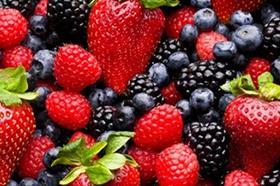
Berries continue to taste success in the UK, with the value of the category rising 11.2 per cent and volumes up 11.1 per cent in the 52 weeks to 7 December [Kantar Worldpanel].
The 2014 British growing season saw “benign” weather stimulate consistent demand while avoiding too many peaks, and the category also benefited from increased demand on the continent and rising inflation.
Despite this, the year was not without its difficulties and raspberries have been among the biggest talking points – figures from trade body British Summer Fruits (BSF) show the category had the biggest volume increase, as consumers responded to stronger varieties that bleed less and have longer storage. However, the market remained challenging for growers as high yields led to strong retail promotions and lower returns.
“Raspberry returns were a little down year-on-year due to high yields and levels of production, meaning some keen promotional pricing at times,” says Nick Marston, managing director of Berry Gardens.
Grower Marion Regan, of Hugh Lowe Farms, agrees: “Although yields were good we had a rather ‘peaky’ raspberry season – both in the floricane and primocane crops – which was quite difficult to manage and prices were poor.”
Raspberries did not deflect from success in other sub-categories, however, where grower returns were up or maintained. Marston explains: “The early season and steady nature of production and demand meant strawberry returns were up year on year, as overall uptake was good and the use of low-cost promotional mechanics was very limited.
“Blueberry and blackberry returns were similar year on year, which is great considering the percentage growth in UK production and thus sales.”
With consumption on the increase, soft fruit’s challenges for the future lie more with production than consumers. “One of the biggest challenges facing the soft-fruit industry is the danger of losing well-used and accepted pesticides and herbicides. We are fighting this all the time,” says BSF chairman Laurence Olins, who believes growers are most concerned about the category of endocrine disruptors.
Already marketed as a premium product, berries continue to win support from retailers – Asda leads the way with 28 per cent value growth and Aldi has the strongest spend growth of 79 per cent. But their success and shelf-space also comes in part from a powerful industry-led campaign, ensuring that the category remains high on the retail agenda.
Olins explains: “Retailers are doing very well – they give us lots of shelf space because berries are a high-value, low-volume product. But we do work very hard to keep them on side. We give them presentations twice a year, and they know they will see me at least once if not twice a year, and the reward for that is shelf space.”
Currently valued at just under £900 million, Olins says the category is on track to reach the £1 billion mark by 2016. Strawberries remain the largest sector at £492.8m, according to Kantar, with nine per cent value growth compared to last year as shoppers purchase more frequently.
British growers are anticipating a strong soft-fruit market in 2015, as demand is high and growing conditions are good so far. On imports, Olins says eastern Mediterranean markets, such as Jordan, Egypt and Israel, remain difficult to source from as usual, as they have strong home markets and challenging geo-political issues, as well as still being able to supply Russia.
Regan says she hopes 2015 brings a “smoother ride” on raspberries as growers aim to “spread the peaks” and extend the season. “I am also looking forward to trialling some new varieties at the premium end of the market,” she adds.



